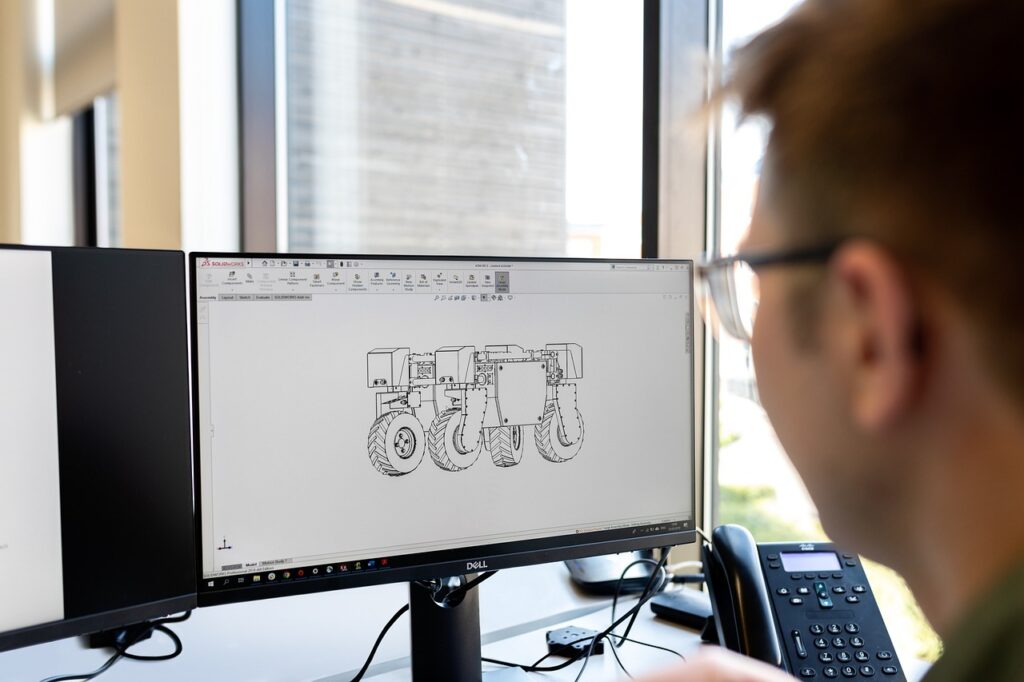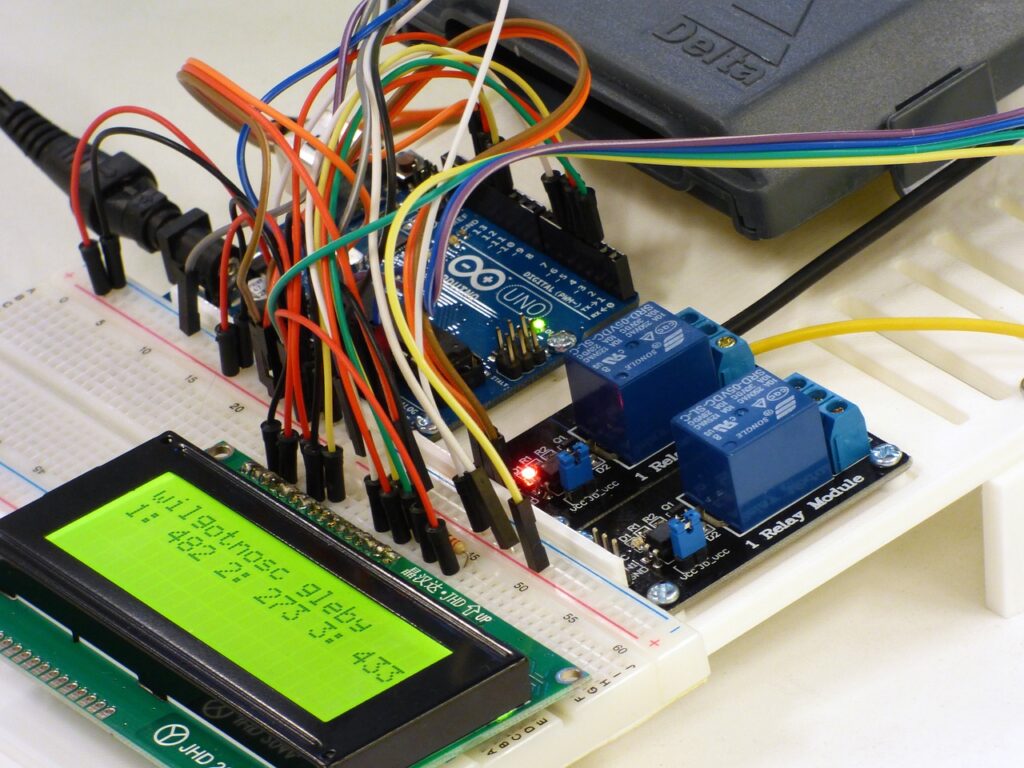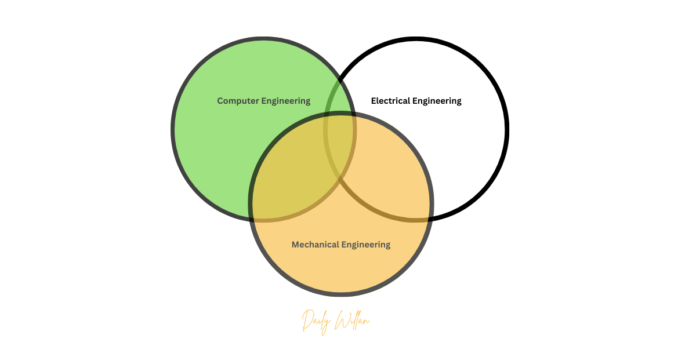Mechatronics is a multidisciplinary field. No field of engineering is of less importance to a mechatronic engineer, and as such, one requires a variety of skills and professional acuity. Ranging from skills in mechanical, electrical and computer engineering. To some degree, an understanding of all fields of engineering is important to be an all-rounded engineer.
In practice, mechatronics engineers are responsible for designing, developing, implementing, and testing mechatronics systems. They are necessary in every step of the product development cycle in a production line.
To be relevant as a mechatronics engineer you need to hone these various technical skills. These skills can be grouped into categories based on their relevance to the field. Here are the top 20 skills every mechatronic engineer must have, to have a hedge in the field.
20 Mechatronics Engineer Skills
Mechanical Engineering Skills
1. Mechanical Design

Mechanical design is the process of creating and developing products and systems, through design language. It involves creating and modelling mechanical components and systems using CAD (Computer-Aided Design) software such as SolidWorks, AutoCAD, or CATIA. Over time the process has improved to be a process of precision and software-based iterations before product development.
Proficiency in CAD (Computer-Aided Design) software like SolidWorks or AutoCAD allows engineers to visualize and test mechanical structures before physical prototypes are created. This skill is essential for developing efficient and reliable mechanical parts that integrate seamlessly with electronic and software components.
Importants Design Software:
- AutoCAD MED
- SolidWorks
- CATIA
- Ansys
Additionally, understanding the principles of mechanics, dynamics, and material science is crucial for designing systems that can withstand various operational stresses and strains. Engineers must also be adept at interpreting technical drawings and specifications to ensure accurate manufacturing and assembly of mechanical parts.
2. Kinematics and Dynamics
Kinematics focuses on the motion of objects without considering the forces that cause the motion, while dynamics involves the analysis of forces and their effects on motion. These principles are essential for designing and controlling mechanical systems such as robotic arms, conveyor belts, and automated machinery.
Mechatronic engineers use mathematical models and simulations to predict the behaviour of mechanical systems under various conditions. This knowledge helps in optimizing the performance and efficiency of mechatronic systems, ensuring smooth and precise operations.
Understanding the principles of motion and forces is crucial for designing mechanical systems that interact with electronics and software.
3. Materials Science
Materials science is the study of material properties and their applications in engineering. Mechatronic engineers need to understand the characteristics of different materials, such as metals, polymers, ceramics, and composites, to select the most suitable materials for their designs. The choice of materials affects the durability, weight, cost, and performance of mechanical components.
Engineers must consider factors such as tensile strength, hardness, thermal conductivity, and corrosion resistance when selecting materials. Knowledge of materials science also aids in understanding manufacturing processes, such as casting, welding, and 3D printing, which are crucial for producing high-quality mechanical parts.
Electrical and Electronic Engineering Skills
4. Circuit Design
Circuit design is a fundamental skill for mechatronic engineers, involving the creation and analysis of electronic circuits that power and control mechanical systems. This includes designing both analogue and digital circuits using software tools like EAGLE, Altium Designer, or KiCad.
Important Circuit Design Software:
- KiCAD
- EAGLE
Altium Designer
As a mechatronic engineer, you must understand the principles of electricity, components such as resistors, capacitors, transistors, and integrated circuits, and how they interact within a circuit. Proficiency in circuit design enables engineers to develop reliable and efficient electronic systems that can interface with sensors, actuators, and microcontrollers. This skill is crucial for creating control systems, power supplies, and communication networks in mechatronic devices.
5. Sensors and Actuators
Mechatronics systems are essentially about sensors and actuators and how they communicate. Sensors gather data from the environment, such as temperature, pressure, and proximity, and convert it into electrical signals. Actuators, on the other hand, convert electrical signals into physical actions, such as moving a robotic arm or opening a valve.
Every mechatronic engineer must be familiar with various types of sensors and actuators and understand how to integrate them into their designs.
6. Microcontroller Programming
Microcontrollers are the brains behind many mechatronic systems, controlling the operations and decision-making processes. Programming microcontrollers such as Arduino, PIC, and ARM Cortex involves writing code to perform specific tasks, such as reading sensor data, controlling actuators, and processing information. Engineers use languages like C, C++, and Assembly to program microcontrollers.

Important Programming Languages:
- C
- C++
- Arduino
- Ladder Logic
These skills are essential for developing embedded systems that can operate autonomously or interact with other devices. Understanding microcontroller programming enables engineers to create efficient and responsive control systems for applications ranging from simple automated machines to complex robotics.
Computer Science and Software Skills
7. Programming Skills
Proficiency in programming languages such as C, C++, Python, and MATLAB is vital for mechatronic engineers. These languages are used to develop control algorithms, data analysis tools, and user interfaces for mechatronic systems. Programming skills enable engineers to write software that can process sensor data, control actuators, and communicate with other devices.
Important Languages:
- C
- C++
- Python
Python, for example, is widely used for its simplicity and versatility in developing automation scripts, data analysis, and machine learning applications. MATLAB is often used for modelling, simulation, and control system design. These skills are crucial for creating intelligent and adaptive mechatronic systems.
8. Control Systems
Control systems are essential for regulating and maintaining the desired performance of mechatronic systems. This involves understanding control theory, including PID (Proportional-Integral-Derivative) controllers, feedback loops, and control algorithms. Engineers use mathematical models to design control systems that can stabilize and optimize the behaviour of mechanical and electronic components.
Knowledge of control systems is crucial for applications such as automated manufacturing, robotics, and aerospace engineering. By implementing effective control strategies, engineers can enhance the precision, efficiency, and reliability of mechatronic systems.
9. Data Analysis
Data analysis involves interpreting and extracting meaningful insights from data collected by sensors and other sources. Mechatronic engineers use data analysis tools and software to evaluate system performance, identify trends, and make data-driven decisions. Skills in data analysis are essential for diagnosing issues, optimizing processes, and improving the overall efficiency of mechatronic systems.
Mechatronic engineers use software such as MATLAB, Python, and R for data analysis and visualization. This skill is crucial for applications such as predictive maintenance, quality control, and system optimization.
Robotics and Automation Skills
10. Robotics
Robotics is a key area in mechatronics, involving the design, development, and control of robotic systems. This includes understanding the principles of kinematics, dynamics, and control of robotic arms and mobile robots. Engineers use mathematical models and simulations to predict and optimize the behaviour of robots.
Proficiency in robotics is essential for applications such as industrial automation, medical devices, and autonomous vehicles. Engineers must also be familiar with robotic programming languages such as ROS (Robot Operating System) and tools like Gazebo for simulation and testing.
11. Automation Systems
Automation systems involve the integration of mechanical, electronic, and software components to create automated processes. This includes understanding industrial automation technologies such as PLCs (Programmable Logic Controllers), SCADA (Supervisory Control and Data Acquisition) systems, and robotics. Engineers design and implement automation systems to improve efficiency, accuracy, and safety in manufacturing and other industries.
12. PLC Programming

PLC programming is essential for developing industrial automation solutions. PLCs (Programmable Logic Controllers) are used to control machinery and processes in manufacturing, energy, and other industries.
Mechatronic engineer must understand and be proficient in the use languages such as Ladder Logic, Structured Text, and Function Block Diagram to program PLCs. .
Interdisciplinary Skills
13. Problem-Solving Skills
Problem-solving skills are essential for mechatronic engineers, as they often face complex and challenging issues in their work. This involves analyzing problems, thinking critically, and developing innovative solutions.
As a mechatronic engineer, you must be able to troubleshoot and resolve issues that arise during the design, development, and implementation of mechatronic systems. Effective problem-solving skills enable engineers to overcome obstacles and achieve project goals.
14. Project Management
Project management skills are crucial for successfully managing complex mechatronic projects. This includes planning, scheduling, and resource allocation to ensure projects are completed on time and within budget.
Engineers use tools such as Gantt charts, project management software, and agile methodologies to manage projects effectively. Proficiency in project management helps engineers coordinate tasks, communicate with stakeholders, and achieve project milestones.
15. Communication Skills
Clear and concise communication is essential for collaborating with multidisciplinary teams, presenting ideas, and documenting work. Mechatronic engineers must be able to explain technical concepts to non-engineers and provide clear instructions and feedback.
Effective communication skills enable engineers to work efficiently in teams, share knowledge, and contribute to the success of mechatronic projects.
Additional Skills
16. Teamwork
Teamwork is crucial for the success of mechatronic projects, as they often require collaboration between engineers from different disciplines. It is essential as a mechatronic engineer to be able to work effectively in teams, share knowledge, and support their colleagues. Strong teamwork skills help engineers achieve project goals and contribute to a positive and productive work environment.
17. Creativity and Innovation
Creativity and innovation are essential for advancing technology and creating new products in the field of mechatronics. Engineers must be able to think creatively, experiment with new ideas, and develop innovative solutions to complex problems. This involves staying updated with the latest trends and technologies and being open to exploring new approaches and methodologies.
18. Continuous Learning
The field of mechatronics is constantly evolving, and engineers must stay updated with the latest technologies, tools, and techniques through continuous learning and professional development.
This involves attending workshops, taking courses, and participating in professional organizations. Continuous learning helps engineers stay competitive and enhance their skills and knowledge.
19. Attention to Detail
Precision and attention to detail to ensure the accuracy and reliability of mechatronic systems.
20. Ethical and Professional Responsibility
Understanding and adhering to ethical standards and professional responsibility to maintain the integrity and safety of mechatronic systems.
How to Learn These Mechatronic Skills
Educational Background
Engineering is a professional career that is backed by 5-6 years in the university, and certification from relevant bodies. Start with a strong foundation in math and science during high school. Pursue a bachelor’s degree in mechatronics engineering or a related field like mechanical or electrical engineering. This will provide a comprehensive understanding of the core principles.
Online Courses and Tutorials
Enroll in online courses from platforms like Coursera, Udemy, and Khan Academy. These courses cover topics such as programming, control systems, and robotics. Many universities also offer free online resources and lectures.
Hands-On Projects
Engage in hands-on projects using microcontrollers like Arduino and Raspberry Pi. Build simple projects to practice your skills and gradually move on to more complex systems. Websites like Instructables and Hackster.io provide project ideas and tutorials.
Programming Skills
Learn programming languages such as C, C++, Python, and MATLAB. These languages are widely used in mechatronics for developing control algorithms and software. Online coding platforms like Codecademy and freeCodeCamp offer interactive lessons.
Join Communities and Forums
Join online communities and forums such as Stack Overflow, Reddit, and specialized mechatronics forums. Engage with other enthusiasts and professionals to share knowledge, ask questions, and get feedback on your projects.
Workshops and Seminars
Attend workshops, seminars, and conferences related to mechatronics. These events provide opportunities to learn from experts, network with peers, and stay updated on the latest advancements in the field.
Internships and Practical Experience
Gain practical experience through internships and part-time jobs in companies that work with mechatronics systems. Real-world experience is invaluable for applying theoretical knowledge and developing problem-solving skills.
Keep Up
A mechatronic engineer need to stay updated with the latest technologies and trends in mechatronics. Read journals, follow industry blogs, and participate in online courses to continuously enhance your skills.










